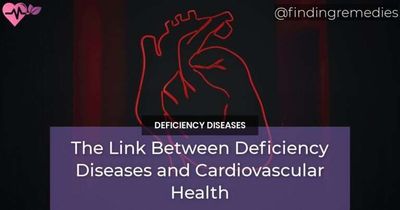Deficiency diseases are a group of conditions that arise from inadequate nutrient intake or poor nutrient absorption. These diseases can have various effects on the body, including an increased risk of chronic diseases such as heart disease, stroke, and high blood pressure.
In this article, we will explore the link between deficiency diseases and cardiovascular health and provide information on managing and preventing these conditions.
Table of Contents
Understanding Deficiency Diseases
Definition of Deficiency Diseases
Deficiency diseases are caused by an inadequate intake or absorption of essential nutrients such as vitamins, minerals, and amino acids. These diseases can have various symptoms and effects on the body, depending on the deficiency.
Causes of Deficiency Diseases
The causes of deficiency diseases can vary depending on the nutrient deficiency. Poor diet, malabsorption, and certain medical conditions can all contribute to the development of deficiency diseases.
Common Types of Deficiency Diseases
Common types of deficiency diseases include anemia (iron deficiency), scurvy (vitamin C deficiency), rickets (vitamin D deficiency), pellagra (niacin deficiency), beriberi (thiamine deficiency), and kwashiorkor (protein deficiency).
The Connection Between Deficiency Diseases and Cardiovascular Health
Overview of Cardiovascular Health
Cardiovascular health refers to the health of the heart and blood vessels. A healthy cardiovascular system is essential for maintaining overall health and reducing the risk of chronic diseases such as heart disease and stroke.
The Impact of Deficiency Diseases on Cardiovascular Health
Deficiency diseases can have a significant impact on cardiovascular health. Iron deficiency anemia, for example, can cause an increased risk of heart attack and stroke, while vitamin D deficiency has been linked to hypertension and heart disease.
The Role of Nutrient Deficiencies in Cardiovascular Disease
Nutrient deficiencies can increase the risk of cardiovascular disease by impairing essential physiological processes. For example, magnesium deficiency can lead to hypertension, while potassium deficiency can cause an irregular heartbeat.
Common Deficiency Diseases Linked to Cardiovascular Health
Iron Deficiency Anemia
Iron deficiency anemia is a common type of anemia caused by a lack of iron in the body. This condition can cause fatigue, shortness of breath, and an increased risk of heart attack and stroke.
Vitamin D Deficiency
Vitamin D deficiency is a prevalent condition that can increase the risk of hypertension, heart disease, and stroke. This nutrient is important for maintaining proper cardiovascular function and reducing inflammation.
Magnesium Deficiency
Magnesium deficiency is a common nutrient deficiency that can increase the risk of hypertension, heart disease, and stroke. This nutrient is essential for maintaining proper muscle and nerve function.
Potassium Deficiency
Potassium deficiency can cause an irregular heartbeat and increase the risk of heart disease and stroke. This nutrient is essential for maintaining proper blood pressure and cardiovascular function.
Symptoms and Signs of Deficiency Diseases
Iron Deficiency Anemia Symptoms
Symptoms of iron deficiency anemia include fatigue, weakness, shortness of breath, and pale skin.
Vitamin D Deficiency Symptoms
Symptoms of vitamin D deficiency include fatigue, bone pain, and muscle weakness.
Magnesium Deficiency Symptoms
Symptoms of magnesium deficiency include muscle cramps, tremors, and irregular heartbeat.
Potassium Deficiency Symptoms
Symptoms of potassium deficiency include muscle weakness, fatigue, and an irregular heartbeat.
Diagnosis and Treatment of Deficiency Diseases
Diagnosis of Deficiency Diseases
Deficiency diseases can be diagnosed through blood tests that measure nutrient levels in the body.
Treatment of Deficiency Diseases
Treatment of deficiency diseases involves addressing the underlying nutrient deficiency through dietary changes or supplements.
Prevention of Deficiency Diseases
Preventing deficiency diseases involves maintaining a healthy diet rich in essential nutrients and taking supplements as needed.
Prevention of Deficiency Diseases for Cardiovascular Health
Eating a Balanced Diet
Eating a balanced diet rich in fruits, vegetables, lean protein, and whole grains can help prevent nutrient deficiencies and reduce the risk of cardiovascular disease.
Nutritional Supplements
Taking nutritional supplements can help prevent nutrient deficiencies and reduce the risk of chronic diseases such as heart disease and stroke.
Lifestyle Changes
Making lifestyle changes such as quitting smoking, reducing stress, and increasing physical activity can also help improve cardiovascular health and prevent deficiency diseases.
The Importance of Regular Health Check-ups
The Benefits of Health Check-ups
Regular health check-ups can help detect nutrient deficiencies and other health conditions early, allowing for prompt treatment and prevention of complications.
Recommended Frequency of Health Check-ups
The recommended frequency of health check-ups varies depending on age, gender, and overall health status. Consult with a healthcare provider to determine the appropriate frequency of health check-ups.
The Role of Exercise in Preventing Deficiency Diseases
The Link Between Exercise and Cardiovascular Health
Regular exercise can help improve cardiovascular health by reducing blood pressure, increasing circulation, and improving overall fitness.
Exercise and Nutrient Absorption
Exercise can also improve nutrient absorption by increasing blood flow and promoting the delivery of nutrients to the muscles.
The Adverse Effects of Deficiency Diseases on Cardiovascular Health
Heart Disease
Deficiency diseases can increase the risk of heart disease by impairing cardiovascular function and increasing inflammation.
Stroke
Deficiency diseases can also increase the risk of stroke by impairing blood flow and increasing the risk of blood clots.
High Blood Pressure
Nutrient deficiencies such as magnesium and potassium deficiency can increase the risk of high blood pressure, a significant risk factor for cardiovascular disease.
In conclusion, Deficiency diseases can have a significant impact on cardiovascular health, increasing the risk of chronic diseases such as heart disease and stroke. Maintaining a healthy diet, taking nutritional supplements, and making lifestyle changes can help prevent nutrient deficiencies and improve cardiovascular health.
Maintaining a healthy diet and lifestyle is essential for preventing deficiency diseases and reducing the risk of chronic diseases such as heart disease and stroke.
By understanding the link between deficiency diseases and cardiovascular health, we can take steps to prevent and manage these conditions and improve overall health and wellbeing.

